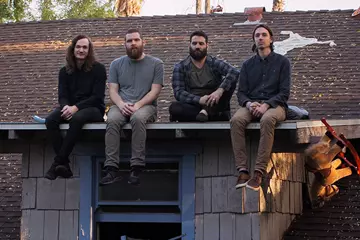 Kathryn Williams
Kathryn WilliamsPreston School Of Industry play The Zoo on Sunday.
It’s a sad reality, but usually you get to speak to your rock idols after the event or recording or incarnation that first ignited the flame of fan adulation. Chatting to Scott ‘Spiral Stairs’ Kannberg is one of those occasions. As co-founder of seminal, genre defying, indie young bloods Pavement, Spiral Stairs, (alongside cohort Stephen Malkmus), helped define a generation musically. Not that everyone even heard it, or that Pavement even really charted anywhere significantly, but Pavement went were few bands had gone before.
Times changed, alliances were forged and forgotten and Pavement broke up. Purists vowed life would never be the same, but it was obvious the remaining members wouldn’t remain stagnant for long.
Malkmus recently released a solo opus, and Kannberg has been busy with his psuedo solo outfit Preston School Of Industry since 2000, not long after the moody Pavement released Terror Twilight. In fact, Kannberg’s first PSOI release All This Sounds Gas was taken from Terror Twilight demos, conveniently hidden on four track for posterity. Since then, the line up and direction has changed several times, from wayward country stoner rock chic to fluttery Tascam meanderings, and the release of the EP Goodbye to the Edge City coincided with the conception of the Amazing Grease label – a partnership between Kannberg, Mike Drake and Ben Lutch. Owning your own alterna-label seems like a natural choice for the guy in Pavement noted for his of attitude. While Kannberg's Spiral Stairs alter ego may be indie rock cool, Scott Kannberg is just a regular guy, chilling out at his San Fran home.
“I’m doing laundry… isn’t that cool? I’m doing whites so I have to do it a special way or my wife will get mad at me.” He drawls, “It’s all pretty mundane.”
Equally mundane, one assumes, is re-hashing the old Pavement war stories for the star struck journo hounds with the good fortune of snaffling a Kannberg interview.
“I don’t get sick of that at all. I’m proud of what I did and what Pavement did and I’m cool with that.”
Is it the beauty of hindsight that has allowed you to see what Pavement meant to others?
Don't miss a beat with our FREE daily newsletter
“You know, it’s amazing. In Pavement people tell you that you’re a good band and all the fan stuff. But kind of since we’ve broken up, I’ve heard a lot more people say all this stuff ‘Oh, you were in Pavement! Oh my gosh!’ Y’know ‘Oh you guys were so great’. And I still don’t believe that we were great, but it’s still amazing to hear people’s reaction, and I guess that’s kinda cool.”
Equally cool is the warm reception new and old fans have given PSOI, but probably more to the point, Kannberg realises that the opinion of the masses ultimately don’t matter and while he is happy that people appreciate what he is doing, he is also happy to release stuff for his own purposes.
“Some people might not like it and that doesn’t bother me, and from what people have said to me, people who have come to my shows, they seem to like it. It’s all nice and positive.”
But mention the man’s label Amazing Grease and you can hear the enthusiasm in his voice increase.
“I started it by seeing a lot of really cool bands around San Francisco and just talking to them and just realising that these people really deserve something to come out, but the people they were dealing with and the kinda information they were getting was just really bogus. I thought my experience of what I’ve been through could really help them out and hopefully put them on the same line we were on, which is to deal with cool people and put out cool records and it’s a good experience and I’m still trying to do that, but it’s a pretty small label.”
With label mates including little known acts like Oranger, Sunless Day, Aaron Nudelman and the Moore Brothers, Kannberg says he is in the venture for the love, not the money, and clearly, not the stress either.
“It’s not about making me any money, it‘s a passion of mine; I love checking out new bands, I love being able to help people get the chance to do what we did. If it wasn’t for a few early people with Pavement, we wouldn’t have kept putting records out, I’m just re-paying the favour.”
But he admit’s, experience aside, it hasn’t been an easy, and there’s a lesson in that for all young record entrepreneurs.
“It’s been hard. I think I thought it was gonna be heaps easier doing all that stuff, but it’s been hard to try to key people on to the bands you have on your label. We’re pretty small, we don’t really have anything that sells over 2000 copies…I think I just deal with it cause I like the records, and I don’t care about any of the other stuff. We keep it small. I guess if we did have a band that sold 10,000 records, I would probably be so busy dealing with that shit that I wouldn’t have enough time to be doing any other stuff, but right now it’s manageable.”
















